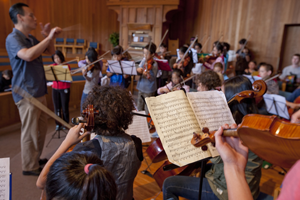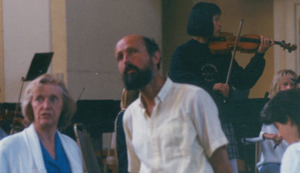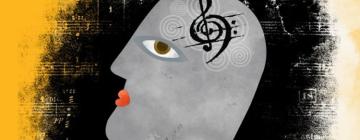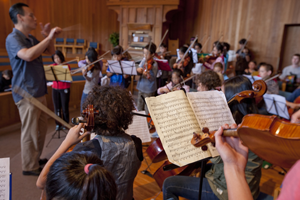On a map of distinguished schools that focus equally on music and traditional academics in this country, one of the great landmarks is the Crowden School. The grade 4 through 8 middle school was the child of violinist Anne Crowden who opened it in 1983. She died in 2004. This year, the school is celebrating its 30th anniversary.

The campus, which is on Rose Street in Berkeley, has gone from a rented-out church basement to what was once a barn, recast, in 1998, as an auditorium, now with one of the most advanced sound systems in the world. The school has gone from 13 students to 80. From a handful of faculty to more than 28 full and part-time instructors.
And from a time when public schools still had music programs to a time when neither public nor many private schools offer music at all.
The Crowden School, a day school for grades four through eight, is part of the Crowden Music Center, a nonprofit umbrella for both the school and an outreach program called the Crowden Center for Music in the Community.
“It was like a startup,” Executive Director Doris Fukawa said the other day talking about the school’s beginnings. “A bunch of us got together, maxed out our credit cards, split up the administrative jobs and began a grand experiment.
“The idea was to have a school where students had the time to immerse themselves in music. For Anne, this was partly in reaction to what she saw from her private students, who were always rushing from one commitment to another without any time to become truly involved in the music. And so, from the beginning, the focus in the school has been to allow more time, but not just to perform, rather to allow students to become well-rounded musicians, to understand what it’s like to be part of a chorus, for example, or an ensemble; to understand history and theory, and to explore the huge academic subject that music is.”
In sum, the Crowden School is a place where students not only learn musicianship but how to like music and, having found a muse, they learn how to follow it.
Arts Education in Full
Thirty years on, the school has an increasingly diverse group of students; about half come from public school. But Fukawa, for one, sees a not so subtle difference in the students from 20 and 30 years ago. “Many students who come to us are not exposed to a lot of the arts in general, whether music or visual arts. They’re not used to going to museums or plays. I would say that for many of our students, and this is true of students coming from private schools as well, coming to Crowden is one of the first times they’ve been exposed to the arts.”
About 15 percent of Crowden students go on to major or minor in music in college. Fukawa says about 50 percent will go on to play their instrument in college, often in an ensemble, even if they don’t study music.
Crowden’s 2012 graduates are going to college this fall at such places as UCLA, Williams College, Columbia University, Bard College, Berklee College of Music, Pepperdine, Stanford University, University of Pittsburgh, UCSC, University of Chicago, Oberlin, Middlebury, and the Peabody Conservatory at Johns Hopkins, Peabody and Sarah Lawrence College.
The 30th anniversary is being marked by a $350,000 gift from the Jacqueline Hoefer Trust to renovate the school auditorium. At the heart of the renovation is a state-of-the-art acoustic system called Constellation, which is made by Meyer Sound, a Berkeley company. The system has been adapted at more than two dozen concert halls in this country, Europe, New Zealand, and South Korea.

“It transforms the space to sound like it could be a church or it could be a theater or a small chamber ensemble room,” says Fukawa, “and all manipulated with an iPad. The beauty of it is that it never sounds like it’s electronic. And think of it for a little five-year-old kid playing the violin, who doesn’t have a very big sound, and now you can hear it.”
Asked her goals over the coming years, Fukawa said she would like to see long-term sustainability “so we’re not wringing our hands ever year. We nearly didn’t make it when the 2008 recession hit us and clearly we need to strengthen our endowment so that anyone who wishes to study at Crowden can. That’s my wish — that every child who wants this can come.”
Annual tuition at the day school ranges between $18,000 and $21,000.
Composer John Adams once described the school this way: “In the face of absolute indifference, with a few like-minded individuals in the community, [Anne Crowden] founded a school whose continued existence is a minor miracle. TCS serves as a model for how a middle school can succeed in every arena … I believe that Anne’s commitment to excellence, that ‘the highest standards possible will be expected from each child according to individual abilities’ is the key.”
Upcoming performance events at Crowden include :
October 6, 2013, 4:00 pm: The Baumer String Quartet. Nathan Olson (Crowden School Class of 2000); Aaron Requiro (Class of 1995), J.T. Posadas, David Requiro (Class of 1999). Founded at the Cleveland Institute of Music as the Kashii Quartet in 2003, BSQ won the Silver Medal at the 2005 Fischoff National Chamber Music Competition and 2nd Prize at the 2005 Yellow Springs Chamber Music Competition. The quartet serves on the faculty at Crowden's summer Chamber Music Workshop.
October 20, 2013, 10 a.m.-3 p.m., Community Music Day
Crowden’s free musical carnival features Crowden’s Instrument Petting Zoo and Very First Concerts with the San Francisco Chamber Orchestra. This year’s Very First Concerts theme is “Small Instruments, Tall Instruments: The Highs and Lows of the Orchestra.” SFCO’s artistic director, Ben Simon, served as Crowden’s director following Anne Crowden's retirement, and SFCO players Eugene Chuklov and Michel Taddei are longtime Crowden faculty members.

